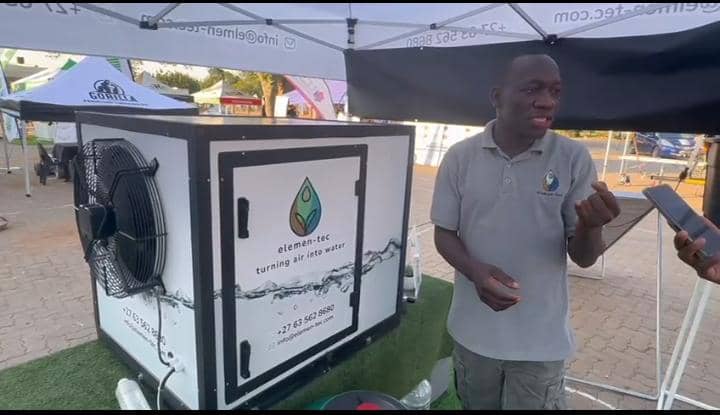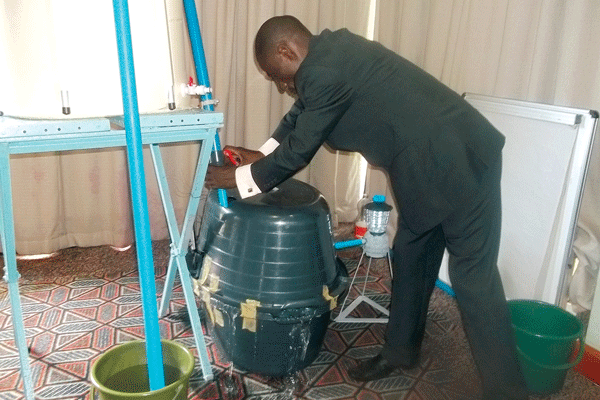SeedCo is seeing more cash being generated by the business as the stock holding levels are being reduced, Chief Executive Officer Morgan Nzwere told analysts at a briefing yesterday.
The group's sales volumes for the year ended 31 March 2013 were 10% lower than the prior period due to a number of factors which include late rains, tight liquidity challenges and price wars.
Presenting on sales volume, Finance Director John Matorofa noted that maize decreased by 3% to 34 667mt. Meanwhile, winter cereals and cotton also recorded 49% and 2% decrease each to 2 758mt and 11 867mt respectively.
Soya beans, however, managed to record an increase of 45% in sales volumes to 7 581mt and this is due to increased demand in the region.
"On maize, as we reported in the first half we had late rains for most of Southern Africa and it had a negative impact on our volumes. For cotton, price disputes earlier in the year in the industry also affected the volumes.
"Winter cereals have remained subdued for quite a while now because of poor prices and power shortages," he said.
Giving the financial highlights Matorofa said revenue went down by 6% from $117.7million in 2012 to $110.6 million in 2013 while the PAT decreased by 34% to $12.6 million.
Operating expenses increased by 5% to $30.9million in the period under review while finance costs went up by 72% to $7.4 million.
"Operating costs went up 5% due to the right sizing costs of $2 million across the group and finance charges went up 72% due to carry over borrowings used to finance the stocks and the increase in interest rates in Zimbabwe and Malawi," he said.
EBIDTA decreased from $29.90 million to $26.34 million in 2013 while EPS also went down from $9.91 million to $6.49 million.
Looking at regional distribution of revenue, Matorofa noted that Zimbabwe contributed 33% down from last year's 38% while Malawi, Zambia, Quton Tanzania and Kenya contributed14%, 23%, 3% and 5% respectively.
Gross margins thickened to 46% from 45% and according to Matorofa this "growth was curtailed by the 134% devaluation of the Malawi kwacha."
"In Malawi, due to the macro economic problems that they have had over the past few years the Kwacha has continued to devaluate so even though our volumes in that market improved significantly the selling price could not match that input because of the Kwacha," said Nzwere.
Total assets improved to $160.5 million from $156.9 million with the inventories coming down from $51.98 million to $43.65 million.
"Inventories went down by 16% because of the decrease in maize stocks from 49 000 mt to 36 900 mt. Zimbabwe stocks also went down from 23 000 mt last year to 13k mt in 2013 therefore the stocks are very balanced now," noted Matorofa.
Looking at borrowings he said; "Borrowings have remained unchanged at $45 million because of delayed payments from major debtors especially government and also the average interest rate on these borrowings has since come down to 11.75% per annum."
Matorofa said in Zimbabwe there has been "good progress on the $13.7million due from the government last year which has cumulatively paid $9.1 million leaving a balance of $4.6 million now expected to be paid before June 2013."
He added that other related input programmes in Zimbabwe owe $11.2 million on current year sales and are expected to pay by September 2013.
Looking at the operating environment, Nzwere told analysts that in Zambia there is an economic boom going on at the moment and the group will be selling almost 30% of the group's sales to the government as they focus on continued participation in inputs schemes by the Zambian government.
"East Africa for us is still a growing market and we are seeing some significant growth in volumes in that market. We have made some inroads into Rwanda and Eastern DRC and that region is showing a lot of promise for us," he said.
Nzwere highlighted that the group has been focusing on reducing stocks to free up cash, chasing up debtors, reducing costs through right-sizing and growing business in new markets.
"In West Africa we identified some technical partners and we've signed a joint venture with them for Nigeria… and we're in the course of rolling out that joint venture.
"Our group has also been working on reducing borrowing costs as well as technology enhancement of research activities," said Nzwere.
Turning to key research and developments by the group, he said they released 16 new varieties in 2013 in various markets and the 300 series was also released.
"Our technology lab is nearing completion and we're expecting it to be completed in the later part of this year," he noted.
Nzwere said their production has been right-sized over the few years while the projected closing maize stock for next year is 16 100mt against 36 600mt recorded in 2013.
The group said maize production in the period 2012/13 was 29 300mt and they are expecting to produce 23.500mt in 2013/14 whilst the total for all crops in the period under review is 58.900mt and they are expecting 48.850mt in the next period.
"We've just put up a new seed processing plant in Kenya commissioned in January and a new acid delinting plant commissioned early this year in Mwanza, Tanzania and Lilongwe, Malawi.
"We're also constructing a modern factory in Malawi and we are expecting it to be completed in April 2014," he said.
He said the group opened up a Depot in DRC and they have recorded good early indications in that region while in Ethiopia the biggest challenge is on production facilities.
He added that they are expecting the new cotton seed businesses to start contributing meaningfully in the coming year.
"In West Africa our market share continues to grow and we are opening up new areas in places like Tanzania…Because we have right-sized our costs with a retrenchment of 100 people our overall cost of doing business should come down," he said.
Nzwere noted that in Zambia next year they are planning to introduce, what they call, the e-voucher which is a system that they have been lobbying for quite some time.
"What it does is that it gives the consumer the choice to choose the variety that he or she likes. We are quite keen for this e-voucher system to come on board because we believe our variety will then take off because of their performing attributes. We think our products will continue to outperform the competition," he concluded.
- zfn
 Second International Airport for Harare
Second International Airport for Harare  Starlink plans to go big in South Africa
Starlink plans to go big in South Africa  'Some very strange things are happening in China!'
'Some very strange things are happening in China!'  Zimbabwe's dollar stock exchange surges 45%
Zimbabwe's dollar stock exchange surges 45%  Gold edges up as traders await guidance
Gold edges up as traders await guidance  Gold shatters $4,000 milestone
Gold shatters $4,000 milestone  Young Investment Professional (YIP) Graduate Programme 2019
Young Investment Professional (YIP) Graduate Programme 2019 

.jpg)









 Young Investment Professional (YIP) Graduate Programme 2019
Young Investment Professional (YIP) Graduate Programme 2019
Editor's Pick